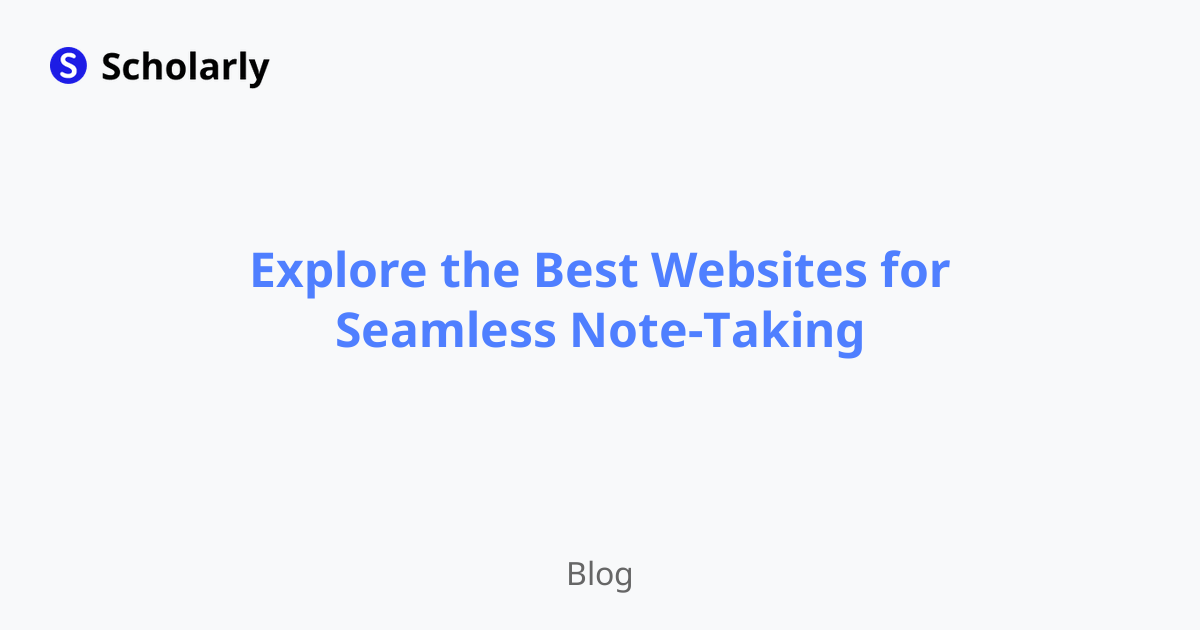Explore the Best Websites for Seamless Note-Taking
Discover the top websites for seamless note-taking, diving into their history, the current tools, and future technological advancements, specifically AI. This in-depth guide covers the benefits, significance, and best practices of effective note-taking. Explore a comparison of tools, different methods and common techniques, the impact AI has on the field, and the challenges faced. Additionally, learn about potential online apps that integrate seamlessly into your note-taking workflow, with a special mention of Scholarly and its groundbreaking features for educational enhancement.

Introduction
With the digital age in full swing, the art of note-taking has evolved dramatically. We're no longer confined to the traditional pen-and-paper method. With a plethora of websites and applications designed for seamless note-taking at our fingertips, there's never been a better time to explore the best of what the digital world has to offer. This article will guide you through the evolution of note-taking, the benefits of modern tools, best practices, as well as a comprehensive comparison of the foremost applications providing you with the ultimate note-taking experience. We'll emphasize the role of AI in transforming how we record and manage information, and particularly focus on Scholarly—a next-gen platform that harnesses the power of AI for educational pursuits.
Past State
Not so long ago, note-taking was a task bound by the limitations of physical media. From carved stone tablets to paper notebooks, the tools used for recording information were static and offered little in terms of flexibility and efficiency. The advent of the personal computer revolutionized how we capture and store data, yet early digital note-taking was often little more than basic text files. Fast forward to today, and we're surrounded by sophisticated note-taking websites and apps that have transformed this basic educational practice into an innovative and dynamic experience.
Current State
Currently, online note-taking platforms cater to diverse needs, from the simplicity of plain text notes to the complexity of integrating multimedia and collaborative features. Popular current applications, like Evernote, OneNote, and Notion, offer rich text editing, multimedia support, and synchronization across devices. Moreover, platforms such as Scholarly (https://scholarly.so/register) are leveraging AI to enhance learning experiences with features like AI-generated text completion and dynamic studying aids.
Future State
The future of note-taking is poised for further transformation, thanks to advancements in AI and machine learning. We anticipate tools will become more intuitive, almost anticipating our needs as we organize our thoughts. AI will not only improve text completion and the creation of study aids but is expected to advance note-taking by intelligently summarizing information, generating questions for study reinforcement, and providing personalized learning suggestions. Scholarly represents a glimpse into this future with its AI auto-completion, transcription, and text-to-speech (TTS) capabilities.
Benefits
Efficiency: Digital note-taking streamlines the process of capturing and organizing information. Accessibility: Notes stored in the cloud can be accessed from anywhere, anytime. Collaboration: Many platforms enable multiple users to work on the same document simultaneously. Customization: Users can tailor their note-taking experience with various tools and layouts. Data Security: Online platforms often come with robust security measures to protect users' data.
Significance
The significance of advanced note-taking tools cannot be overstated. By enhancing how we gather, manage, and recall information, they play a vital role in educational and professional contexts. Scholarly revolutionizes this even further by integrating AI-driven features that elevate the learning process.
Best Practices
Organized Structure: Keep notes tidy with headers and lists. Regular Review: Revisiting notes helps retention. Multimedia Integration: Use images and videos to enhance understanding. Cloud Backup: Ensure your notes are always backed up online. Utilize AI Features: Make use of AI offerings like those from Scholarly to enrich your study experience.
Pros and Cons
Pros: Convenience, versatility, and increased productivity. Cons: Dependence on technology, potential privacy concerns, and the learning curve for new software.
Comparison
Evaluate various note-taking platforms such as Evernote, Notion, OneNote, and Scholarly. Compare their features, usability, and how they integrate AI to smoothen the note-taking process.
Methods
Outlining: A structured way to capture key points. Mind Mapping: Visually organize thoughts. The Cornell Method: A systematic format for clarity. Bullet Journaling: Combining to-do lists with note-taking. Recording Lectures: Complementing notes with audio.
AI Impact
AI impacts note-taking in many ways, from improving efficiency to offering personalized learning. Scholarly employs AI for flashcard creation, transcription, and TTS, setting the stage for a revolutionary educational experience.
Common Techniques
From active listening to employing mnemonic devices, these techniques help in effective note-taking. Scholarly aids these techniques with its AI-generated prompts and study aids.
Challenges
As we move to digital note-taking, challenges include keeping up with rapidly evolving technologies, ensuring data privacy, and finding the right platform that suits individual needs.
Potential Online Apps
Discover online apps tailored for note-taking, such as Scholarly. Examine their unique offerings and how they improve the learning and note-taking process.
Additional Subheadings
Explore related topics such as effective study habits, leveraging technology in education, and the role of AI in continuous learning and self-improvement.
Conclusion
We've traversed the landscape of modern note-taking, weighing the benefits and challenges, and examining the significant role of AI. Scholarly stands out with its robust, AI-infused features, promising a more intelligent and efficient note-taking and learning experience.
Try Our Popular AI Study Tools
Transform your study materials into interactive learning experiences with our most popular AI-powered tools:
PDF to Flashcards
Convert lecture notes and textbooks into study flashcards instantly
Text to Flashcards
Turn any text or notes into comprehensive flashcard sets
Image to Flashcards
Convert diagrams and handwritten notes into digital flashcards
YouTube to Flashcards
Generate flashcards from educational video content



